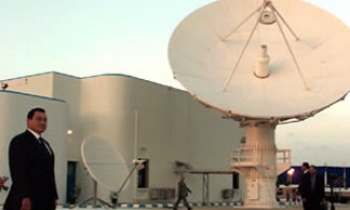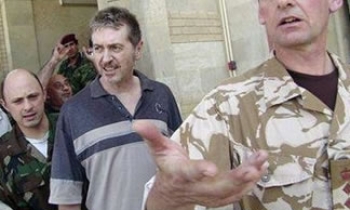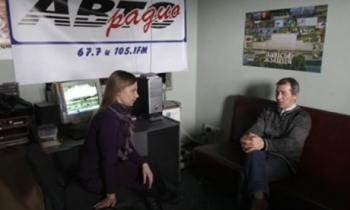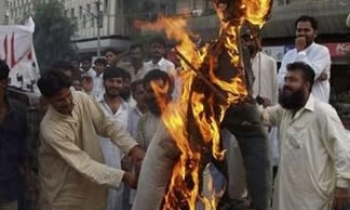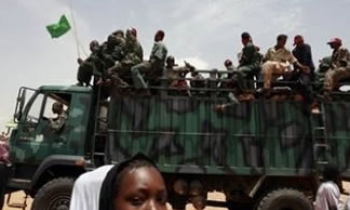An Israeli air strike hit a Reuters vehicle in Gaza City on Saturday, wounding two journalists as they covered a military incursion, the news agency reported. One of the Palestinian journalists, who worked for a local media organisation, was seriously wounded. A cameraman working for Reuters was knocked unconscious in the air strike, one of several in the area.

Sabah Hamida, who works for a local news website, was seriously wounded in the legs. Fadel Shama'a, a Reuters cameraman, received no major bodily wounds, but was knocked unconscious. Doctors said his condition was not life-threatening. Blood spattered the seats of the armoured vehicle and the ground nearby.
The Israeli army claimed the vehicle was hit because it was acting suspiciously in an area of combat and had not been identified as belonging to the media. "During the operation, there was an aerial attack on a suspicious vehicle that drove in a suspicious manner right by the forces," army spokeswoman Captain Noa Meir said. "This car was not identified by the army as a press vehicle. If journalists were hurt, we regret it."
However, the white sport utility vehicle was emblazoned with the Reuters logo and had "TV" and "Press" written on it in English, Arabic and Hebrew.
Michael Lawrence, Reuters Managing Editor for Europe, Middle East and Africa, said: "We are deeply concerned at this attack on a clearly marked press vehicle as journalists were doing their job to report the story from Gaza. We understand that the army says it had no intention of targetting the media, but this incident is totally unacceptable and we urge a careful examination of how this happened to ensure there is no repeat."
"This is a cold-blooded crime," said Mohammed Dawdi, head of the local journalists union.

The airstrike on the journalists' vehicle came as Israeli soldiers backed by two dozen tanks, two bulldozers, helicopters and drone planes moved into an area just inside the Gaza Strip near the Karni crossing, Associated Press (AP) reported quoting witnesses and Palestinian security officials.
The troops were searching for explosives planted by Palestinian militants alongside the border fence and for tunnels under the border. After the operation began, groups of militants repeatedly gathered to try to attack the soldiers, the army and witnesses said.
Shama'a, 23, and Hamida, 25, had the doors open and were about to get out of the armoured vehicle in the nearby Shajaiyeh neighborhood to film the raid when it was struck by the missiles, according to Shamas Odeh, chief of Reuters TV in Gaza. The cameramen, along with three bystanders, were injured with shrapnel wounds and all five were to undergo surgery, hospital officials said.
The front seats of the car were covered in blood and shrapnel had ripped up much of the inside of the vehicle. One of the bulletproof windows was completely destroyed.
Israel has often targetted Palestinian militants in the Gaza Strip with air strikes during an uprising since 2000. More than 180 Palestinians, about half of them militants, have been killed since Israel launched an offensive in June aimed at recovering a captured soldier and ending cross-border rocket fire. Israel withdrew troops and settlers from the Gaza Strip in September 2005 after 38 years of occupation.

Palestine Television cameraman Ibrahim al-Atla was hit by shrapnel during a lull in shooting between Palestinian militants and Israeli forces in the densely-populated Shijaiyah neighborhood of Gaza City on July 26. Palestine Television head Mohammed al-Dahoudi told Committee to Protect Journalists (CPJ) that al-Atla was wearing a vest clearly indicating that he was a journalist.
Al-Atla was moving with a Reuters cameraman and a cameraman from the Cairo-based Ramattan News Agency to film civilians who had been caught in the fighting, when a shell landed nearby. Atla was rushed to Gaza's al-Shifa hospital with shrapnel in his lungs and spine. He was transferred to a Tel Aviv hospital today for surgery.
"The Israelis saw us clearly, we were journalists wearing vests and helmets," said Ramattan cameraman Anas Rehan. "The tank undoubtedly targeted us," he told CPJ. He added that there were no Palestinian gunmen standing near the journalists.
An Israel Defence Forces (IDF) spokesman said the army would investigate the incident. "Israel doesn't have a habit of hitting people not engaged in fighting," he told CPJ. "Otherwise, we wouldn't launch leaflets such as in southern Lebanon, to warn people of conflict areas."
"Israel needs to investigate all of the recent attacks on media and it must eliminate this pattern of targetting," asserted International Federation of Journalists (IFJ) General Secretary Aidan White. "The appalling perception is of soldiers opening fire on unarmed journalists and of intimidation of Arab journalists to keep them from covering the news in the Palestinian territories and in Lebanon."


